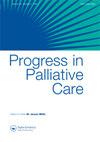Do palliative care research priorities match those for its care? A journals content analysis 2021–22
IF 0.8
Q4 PUBLIC, ENVIRONMENTAL & OCCUPATIONAL HEALTH
引用次数: 1
Abstract
Background Most international definitions of palliative care in the worlds of policy and practice emphasize the ‘holistic’ dimensions of end-of-life experience and its care.Aim To discover whether the definitions of palliative care are reflected in the field’s research priorities.Design and Setting A content analysis of two research journals, one British and the other American, is described to provide a simple indicative answer to this question. The abstracts of 609 research papers drawn from these two journals between the years 2021–22 were examined thematically.Results The categories of physical alone, physical, and psychological, and psychological alone, when combined accounted for 69% of all research reports. The broader social aspects of care, outside of communication and advance care planning, were largely unaddressed. The social domain accounted for 29%, but 78% of this figure was about advance care planning and communication. Likewise, the role of spirituality, present in most of the definitions, was under researched and under reported. Even within this context, the results were disappointing. Spiritual care accounted for only 2% of reports.Conclusion Examination of research publications of two major palliative care research journals showed a significant overemphasis on symptom management and health service delivery assessments. This significant dearth of investigation in the major areas of social and spiritual domains is a call to action for researchers, grant making bodies, researchers, ethics committees, and journal editorial teams.姑息治疗研究的重点是否与其护理相匹配?A期刊内容分析2021-22
在政策和实践领域,大多数国际上对姑息治疗的定义都强调临终体验及其护理的“整体”维度。目的了解姑息治疗的定义是否反映在该领域的研究重点中。设计和设置对两份研究期刊的内容分析,一个是英国的,另一个是美国的,描述为这个问题提供一个简单的指示性答案。本文对这两份期刊在2021 - 2022年间发表的609篇研究论文的摘要进行了主题分析。结果单独的生理、生理和心理以及单独的心理三种类型占所有研究报告的69%。在沟通和预先护理计划之外,护理的更广泛的社会方面基本上没有得到解决。社交领域占29%,但其中78%是关于提前护理计划和沟通。同样,在大多数定义中存在的灵性的作用也没有得到充分的研究和报道。即使在这种背景下,结果也令人失望。精神护理只占报告的2%。结论对两大姑息治疗研究期刊的研究出版物的检查显示,症状管理和卫生服务提供评估显着过度强调。在社会和精神领域的主要领域调查的严重缺乏是对研究人员、拨款机构、研究人员、伦理委员会和期刊编辑团队的行动呼吁。
本文章由计算机程序翻译,如有差异,请以英文原文为准。
求助全文
约1分钟内获得全文
求助全文
来源期刊

PROGRESS IN PALLIATIVE CARE
PUBLIC, ENVIRONMENTAL & OCCUPATIONAL HEALTH-
CiteScore
2.60
自引率
11.80%
发文量
24
期刊介绍:
Progress in Palliative Care is a peer reviewed, multidisciplinary journal with an international perspective. It provides a central point of reference for all members of the palliative care community: medical consultants, nurses, hospital support teams, home care teams, hospice directors and administrators, pain centre staff, social workers, chaplains, counsellors, information staff, paramedical staff and self-help groups. The emphasis of the journal is on the rapid exchange of information amongst those working in palliative care. Progress in Palliative Care embraces all aspects of the management of the problems of end-stage disease.
 求助内容:
求助内容: 应助结果提醒方式:
应助结果提醒方式:


